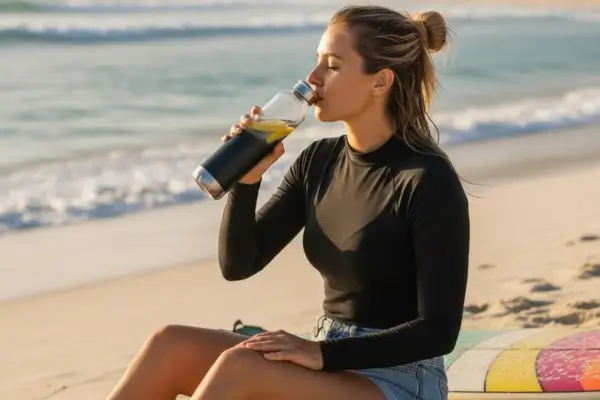Surfing demands energy, focus, and stamina, and one of the most overlooked aspects of performance in the water is hydration. While it’s easy to associate dehydration with long runs or intense workouts on land, surfers are equally at risk. Hours in the ocean, exposure to the sun, and constant paddling can quickly drain the body of essential fluids and minerals. For women surfers, who may face unique physiological needs, hydration becomes an even more essential part of preparing for and recovering from surf sessions.
This article explores beach-friendly hydration strategies designed specifically for women surfers. From what to drink before paddling out, to the best portable options to carry, to recovery strategies after leaving the waves, these insights will help create a complete hydration routine that supports both health and performance.
Why Hydration Matters in Surfing
Surfing often tricks people into underestimating their hydration needs. Because the sport is practiced in water, there’s no visible sweat, even though the body is constantly losing fluids through exertion and heat exposure. Add salty seawater, which can increase thirst, and long sessions that sometimes last several hours, and it becomes clear why hydration is critical.
Dehydration can lead to:
- Decreased stamina: Muscles fatigue faster without adequate water.
- Reduced concentration: Timing waves and reacting quickly becomes harder.
- Slower recovery: Soreness and cramping often feel worse when hydration is neglected.
For women surfers, the balance of electrolytes such as sodium, potassium, and magnesium plays an important role in preventing cramps and maintaining energy during long surf sessions.
Preparing for a Hydrated Surf Session
Hydration starts before you hit the water. Waiting until you’re thirsty is often too late, since thirst usually indicates the body is already dehydrated.
1. Hydrate Early in the Day
Drink a full glass of water upon waking, especially if planning an early surf session. Adding a slice of lemon or a pinch of sea salt can help boost electrolytes naturally.
2. Balance Water and Electrolytes
Pure water is essential, but relying only on it during long surf days may dilute electrolytes. Coconut water, or homemade drinks with fruit and mineral salts, can prepare your body for more demanding sessions.
3. Limit Diuretics Before Surfing
Coffee is a favorite pre-surf ritual for many, but it can increase fluid loss. If you drink coffee, balance it with extra water before paddling out.
Beach-Friendly Hydration Options
Once you’re at the beach, convenience and portability matter. A hydration routine only works if it’s easy to follow, even while dealing with sandy bags and surf gear.
Stainless Steel or Recycled Bottles
Plastic-free bottles are eco-friendly and keep drinks cool under the sun. Wide-mouth designs are easier to clean and refill, and insulated models maintain temperature for hours.
Infused Waters
Carrying sliced fruit like oranges, cucumber, or berries in your water not only adds flavor but also contributes extra vitamins.
Natural Electrolyte Drinks
Instead of sugary sports drinks, opt for natural mixes:
- Coconut water with a pinch of Himalayan salt
- Blended watermelon juice with lime
- Herbal teas (like hibiscus or mint) chilled in a reusable bottle
Portable Hydration Packs
For those spending long stretches in the water or on beach treks, small hydration packs designed for outdoor sports can be an excellent option.
Step-by-Step Hydration Routine for Women Surfers
- Pre-Surf: Drink 300–500 ml of water or natural electrolyte beverage at least 30 minutes before entering the water.
- During Surf: If surfing longer than 2 hours, take breaks to sip water on the beach. Keep your bottle accessible.
- Post-Surf: Rehydrate with water and replenish electrolytes. Smoothies with banana, spinach, or chia seeds can help restore minerals.
- Throughout the Day: Continue sipping small amounts of water rather than drinking large quantities all at once, which can overwhelm the body.
Foods That Support Hydration
Hydration isn’t just about what you drink—foods with high water content can also contribute. Women surfers can benefit from packing snacks such as:
- Watermelon: Hydrating and rich in electrolytes.
- Cucumber sticks: Easy to pack, refreshing, and low-calorie.
- Oranges or mandarins: Convenient, peelable, and vitamin-rich.
- Celery with nut butter: Combines hydration with protein and fats for sustained energy.
Avoiding Common Hydration Mistakes
Even experienced surfers sometimes fall into habits that compromise hydration. Here are a few to watch out for:
- Only drinking when thirsty: By the time thirst hits, performance is already impaired.
- Over-relying on sugary drinks: Commercial sodas or sports drinks often cause energy crashes.
- Forgetting recovery hydration: The body continues to lose fluids even after leaving the water.
Beyond Physical Benefits: Mental Clarity and Confidence
Proper hydration doesn’t only impact physical stamina. It also affects mental clarity, decision-making, and confidence in the lineup. For women surfers—especially beginners—confidence is key. Staying hydrated means sharper reflexes, quicker decisions when choosing waves, and more energy to paddle without hesitation.
Staying Consistent
Hydration is not a one-time effort but a daily practice. Building small, sustainable habits ensures long-term benefits. Keeping a reusable bottle nearby, adding natural flavors to make water more appealing, and tracking intake through apps or journals can help maintain consistency.
A Lifestyle of Care for Body and Ocean
Choosing hydration strategies that support both health and sustainability creates a deeper connection between women surfers and the ocean they love. Opting for reusable bottles, natural electrolyte sources, and plastic-free habits reduces personal waste while fostering mindful self-care.
When women surfers approach hydration as part of their surfing lifestyle, they don’t just improve performance—they align with the rhythm of the sea, taking care of themselves while protecting the environment. It’s a small but powerful step toward becoming stronger, more confident, and more connected surfers.




